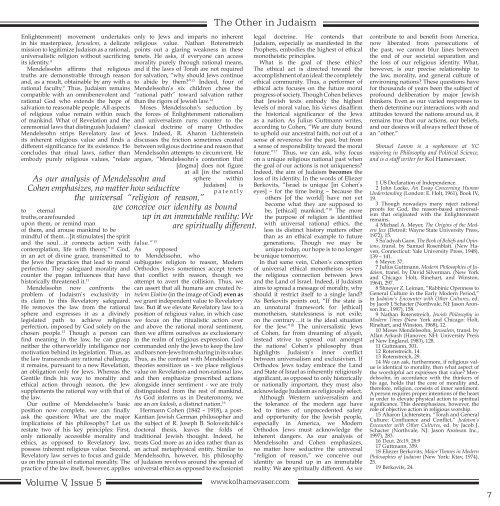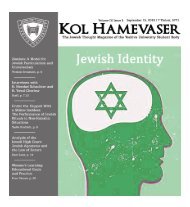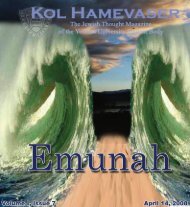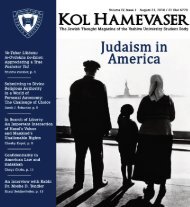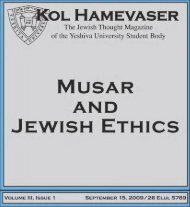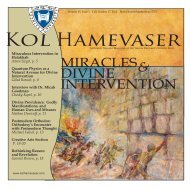The Other in Judaism - Kol Hamevaser
The Other in Judaism - Kol Hamevaser
The Other in Judaism - Kol Hamevaser
Create successful ePaper yourself
Turn your PDF publications into a flip-book with our unique Google optimized e-Paper software.
Enlightenment) movement undertakes<br />
<strong>in</strong> his masterpiece, Jerusalem, a delicate<br />
mission to legitimize <strong>Judaism</strong> as a rational,<br />
universalistic religion without sacrific<strong>in</strong>g<br />
its identity. 8<br />
Mendelssohn affirms that religious<br />
truths are demonstrable through reason<br />
and, as a result, obta<strong>in</strong>able by any with a<br />
rational faculty. 9 Thus, <strong>Judaism</strong> rema<strong>in</strong>s<br />
compatible with an omnibenevolent and<br />
rational God who extends the hope of<br />
salvation to reasonable people. All aspects<br />
of religious value rema<strong>in</strong> with<strong>in</strong> reach<br />
of mank<strong>in</strong>d. What of Revelation and the<br />
ceremonial laws that dist<strong>in</strong>guish <strong>Judaism</strong><br />
Mendelssohn strips Revelatory law of<br />
its <strong>in</strong>herent religious value and f<strong>in</strong>ds a<br />
different significance for its existence. He<br />
concludes that ritual laws, rather than<br />
embody purely religious values, “relate<br />
to eternal<br />
truths, or are founded<br />
upon them, or rem<strong>in</strong>d man<br />
of them, and arouse mank<strong>in</strong>d to be<br />
m<strong>in</strong>dful of them…[it stimulates] the spirit<br />
and the soul…it connects action with<br />
contemplation, life with theory.” 10 God,<br />
<strong>in</strong> an act of div<strong>in</strong>e grace, transmitted to<br />
the Jews the practices that lead to moral<br />
perfection. <strong>The</strong>y safeguard morality and<br />
counter the pagan <strong>in</strong>fluences that have<br />
historically threatened it. 11<br />
Mendelssohn now confronts the<br />
problem of <strong>Judaism</strong>’s exclusivity <strong>in</strong><br />
its claim to this Revelatory safeguard.<br />
He removes the law from the rational<br />
sphere and expresses it as a div<strong>in</strong>ely<br />
legislated path to achieve religious<br />
perfection, imposed by God solely on the<br />
chosen people. 12 Though a person can<br />
f<strong>in</strong>d mean<strong>in</strong>g <strong>in</strong> the law, he can grasp<br />
neither the otherworldly <strong>in</strong>telligence nor<br />
motivation beh<strong>in</strong>d its legislation. Thus, as<br />
the law transcends any rational challenge,<br />
it rema<strong>in</strong>s, pursuant to a new Revelation,<br />
an obligation only for Jews. Whereas the<br />
Gentile f<strong>in</strong>ds his way to morality and<br />
ethical action through reason, the Jew<br />
supplements the rational way with that of<br />
the law.<br />
Our outl<strong>in</strong>e of Mendelssohn’s basic<br />
position now complete, we can f<strong>in</strong>ally<br />
ask the question: What are the major<br />
implications of his philosophy Let us<br />
restate two of his key pr<strong>in</strong>ciples: First,<br />
only rationally accessible morality and<br />
ethics, as opposed to Revelatory law,<br />
possess <strong>in</strong>herent religious value. Second,<br />
Revelatory law serves to focus and guide<br />
us on the pursuit of rational morality. <strong>The</strong><br />
practice of the law itself, however, applies<br />
Volume V, Issue 5<br />
only to Jews and imparts no <strong>in</strong>herent<br />
religious value. Nathan Rotenstreich<br />
po<strong>in</strong>ts out a glar<strong>in</strong>g weakness <strong>in</strong> these<br />
tenets. He asks, if everyone can access<br />
morality purely through rational means,<br />
and if the laws of Torah are not required<br />
for salvation, “why should Jews cont<strong>in</strong>ue<br />
to abide by them” 13 Indeed, four of<br />
Mendelssohn’s six children chose the<br />
“rational path” toward salvation rather<br />
than the rigors of Jewish law. 14<br />
Moses Mendelssohn’s seduction by<br />
the forces of Enlightenment rationalism<br />
and universalism runs counter to the<br />
classical doctr<strong>in</strong>e of many Orthodox<br />
Jews. Indeed, R. Aharon Lichtenste<strong>in</strong><br />
discusses the friction sometimes created<br />
between religious doctr<strong>in</strong>e and reason that<br />
Mendelssohn attempts to circumvent. He<br />
argues, “Mendelssohn’s contention that<br />
[dogma] does not figure<br />
at all [<strong>in</strong> the rational<br />
As our analysis of Mendelssohn and<br />
Cohen emphasizes, no matter how seductive<br />
the universal “religion of reason,”<br />
sphere with<strong>in</strong><br />
<strong>Judaism</strong>] is<br />
patently<br />
we conceive our identity as bound<br />
up <strong>in</strong> an immutable reality: We<br />
are spiritually different.<br />
false.” 15<br />
As opposed<br />
to Mendelssohn, who<br />
subjugates religion to reason, Modern<br />
Orthodox Jews sometimes accept tenets<br />
that conflict with reason, though we<br />
attempt to avert the collision. Thus, we<br />
can assert that all humans are created betselem<br />
Elokim (<strong>in</strong> the image of God) even as<br />
we grant <strong>in</strong>dependent value to Revelatory<br />
law. But if we elevate Revelatory law to a<br />
position of religious value, <strong>in</strong> which case<br />
we focus on the ritualistic action over<br />
and above the rational moral sentiment,<br />
then we affirm ourselves as exclusionary<br />
<strong>in</strong> the realm of religious expression. God<br />
commanded only the Jews to keep the law<br />
and bars non-Jews from shar<strong>in</strong>g <strong>in</strong> its value.<br />
Thus, as the contrast with Mendelssohn’s<br />
theories sensitizes us - we place religious<br />
value on Revelation and non-rational law,<br />
and then emphasize prescribed actions<br />
alongside <strong>in</strong>ner sentiment - we are truly<br />
dist<strong>in</strong>guished from the rest of mank<strong>in</strong>d.<br />
As God <strong>in</strong>forms us <strong>in</strong> Deuteronomy, we<br />
are an am kadosh, a dist<strong>in</strong>ct nation. 16<br />
Hermann Cohen (1842 – 1918), a post-<br />
Kantian Jewish German philosopher and<br />
the subject of R. Joseph B. Soloveitchik’s<br />
doctoral thesis, leaves the folds of<br />
traditional Jewish thought. Indeed, he<br />
treats God more as an idea rather than as<br />
an actual metaphysical entity. Similar to<br />
Mendelssohn, however, his philosophy<br />
of <strong>Judaism</strong> revolves around the spread of<br />
universal ethics as opposed to exclusionist<br />
<strong>The</strong> <strong>Other</strong> <strong>in</strong> <strong>Judaism</strong><br />
www.kolhamevaser.com<br />
legal doctr<strong>in</strong>e. He contends that<br />
<strong>Judaism</strong>, especially as manifested <strong>in</strong> the<br />
Prophets, embodies the highest of ethical<br />
monotheistic pr<strong>in</strong>ciples.<br />
What is the goal of these ethics<br />
<strong>The</strong> ethical act is directed toward the<br />
accomplishment of an ideal: the completely<br />
ethical community. Thus, a performer of<br />
ethical acts focuses on the future moral<br />
progress of society. Though Cohen believes<br />
that Jewish texts embody the highest<br />
levels of moral value, his views disaffirm<br />
the historical significance of the Jews<br />
as a nation. As Julius Guttmann writes,<br />
accord<strong>in</strong>g to Cohen, “We are duty bound<br />
to uphold our ancestral faith, not out of a<br />
sense of reverence for the past, but from<br />
a sense of responsibility toward the moral<br />
future.” 17 Thus, we can ask, why focus<br />
on a unique religious national past when<br />
the goal of our actions is not uniqueness<br />
Indeed, the aim of <strong>Judaism</strong> becomes the<br />
loss of its identity. In the words of Eliezer<br />
Berkovits, “Israel is unique [<strong>in</strong> Cohen’s<br />
eyes] – for the time be<strong>in</strong>g – because the<br />
others [of the world] have not yet<br />
become what they are supposed to<br />
be, [ethical] mank<strong>in</strong>d.” 18 <strong>The</strong> more<br />
the purpose of religion is identified<br />
with universal rational ethics, the<br />
less its dist<strong>in</strong>ct history matters other<br />
than as an ethical example to future<br />
generations. Though we may be<br />
unique today, our hope is to no longer<br />
be unique tomorrow.<br />
In that same ve<strong>in</strong>, Cohen’s conception<br />
of universal ethical monotheism severs<br />
the religious connection between Jews<br />
and the Land of Israel. Indeed, if <strong>Judaism</strong><br />
aims to spread a message of morality, why<br />
should it restrict itself to a s<strong>in</strong>gle land<br />
As Berkovits po<strong>in</strong>ts out, “If the state is<br />
an unnatural framework for [ethical]<br />
monotheism, statelessness is not exile;<br />
on the contrary…it is the ideal situation<br />
for the Jew.” 19 <strong>The</strong> universalistic Jews<br />
of Cohen, far from dream<strong>in</strong>g of aliyyah,<br />
<strong>in</strong>stead strive to spread out amongst<br />
the nations! Cohen’s philosophy thus<br />
highlights <strong>Judaism</strong>’s <strong>in</strong>ner conflict<br />
between universalism and exclusivism. If<br />
Orthodox Jews today embrace the Land<br />
and State of Israel as <strong>in</strong>herently religiously<br />
significant, as opposed to only historically<br />
or nationally important, they must also<br />
acknowledge <strong>Judaism</strong> as religiously select.<br />
Although Western universalism and<br />
the tolerance of the modern age have<br />
led to times of unprecedented safety<br />
and opportunity for the Jewish people,<br />
especially <strong>in</strong> America, we Modern<br />
Orthodox Jews must acknowledge the<br />
<strong>in</strong>herent dangers. As our analysis of<br />
Mendelssohn and Cohen emphasizes,<br />
no matter how seductive the universal<br />
“religion of reason,” we conceive our<br />
identity as bound up <strong>in</strong> an immutable<br />
reality: We are spiritually different. As we<br />
contribute to and benefit from America,<br />
now liberated from persecutions of<br />
the past, we cannot blur l<strong>in</strong>es between<br />
the end of our societal separation and<br />
the loss of our religious identity. What,<br />
however, is our precise relationship to<br />
the law, morality, and general culture of<br />
environ<strong>in</strong>g nations <strong>The</strong>se questions have<br />
for thousands of years been the subject of<br />
profound deliberation by major Jewish<br />
th<strong>in</strong>kers. Even as our varied responses to<br />
them determ<strong>in</strong>e our <strong>in</strong>teractions with and<br />
attitudes toward the nations around us, it<br />
rema<strong>in</strong>s true that our actions, our beliefs,<br />
and our desires will always reflect those of<br />
an “other.”<br />
Shmuel Lamm is a sophomore at YC<br />
major<strong>in</strong>g <strong>in</strong> Philosophy and Political Science,<br />
and is a staff writer for <strong>Kol</strong> <strong>Hamevaser</strong>.<br />
1 US Declaration of Independence.<br />
2 John Locke, An Essay Concern<strong>in</strong>g Human<br />
Understand<strong>in</strong>g (London: E. Holt, 1961), Book IV,<br />
19.<br />
3 Though nowadays many reject rational<br />
proofs for God, the reason-based universalism<br />
that orig<strong>in</strong>ated with the Enlightenment<br />
rema<strong>in</strong>s.<br />
4 Michael A. Meyer, <strong>The</strong> Orig<strong>in</strong>s of the Modern<br />
Jew (Detroit: Wayne State University Press,<br />
1972), 15.<br />
5 Sa’adyah Gaon. <strong>The</strong> Book of Beliefs and Op<strong>in</strong>ions,<br />
transl. by Samuel Rosenblatt. (New Haven,<br />
Connecticut: Yale University Press, 1948),<br />
139 – 141.<br />
6 Meyer, 37.<br />
7 Julius Guttmann, Modern Philosophies of <strong>Judaism</strong>,<br />
transl. by David Silverman. (New York<br />
and Chicago: Holt, R<strong>in</strong>ehart, and W<strong>in</strong>ston,<br />
1964), 297.<br />
8 Shneyer Z. Leiman, “Rabb<strong>in</strong>ic Openness to<br />
General Culture <strong>in</strong> the Early Modern Period,”<br />
<strong>in</strong> <strong>Judaism</strong>’s Encounter with <strong>Other</strong> Cultures, ed.<br />
by Jacob J. Schacter (Northvale, NJ: Jason Aronson<br />
Inc., 1997), 158.<br />
9 Nathan Rotenstreich, Jewish Philosophy <strong>in</strong><br />
Modern Times (New York and Chicago: Holt,<br />
R<strong>in</strong>ehart, and W<strong>in</strong>ston, 1968), 12.<br />
10 Moses Mendelssohn, Jerusalem, transl. by<br />
Allan Arkush (Hanover, NH: University Press<br />
of New England, 1983), 128.<br />
11 Guttmann, 301.<br />
12 Rotenstreich, 14.<br />
13 Rotenstreich, 29.<br />
14 We can ask, furthermore, if religious value<br />
is identical to morality, then what aspect of<br />
the worshipful act expresses that value Mendelssohn,<br />
<strong>in</strong> accordance with the th<strong>in</strong>kers of<br />
his age, holds that the core of morality and,<br />
therefore, religion, consists of <strong>in</strong>ner sentiment.<br />
A person requires proper <strong>in</strong>tentions of the heart<br />
<strong>in</strong> order to elevate physical action to spiritual<br />
significance. This deemphasizes, however, the<br />
role of objective action <strong>in</strong> religious worship.<br />
15 Aharon Lichtenste<strong>in</strong>, “Torah and General<br />
Culture: Confluence and Conflict,” <strong>Judaism</strong>’s<br />
Encounter with <strong>Other</strong> Cultures, ed. by Jacob J.<br />
Schacter (Northvale, NJ: Jason Aronson Inc.,<br />
1997), 283.<br />
16 Deut. 26:19, 28:9<br />
17 Guttmann, 359.<br />
18 Eliezer Berkovits, Major <strong>The</strong>mes <strong>in</strong> Modern<br />
Philosophies of <strong>Judaism</strong> (New York: Ktav, 1974),<br />
25.<br />
19 Berkovits, 24.<br />
7


